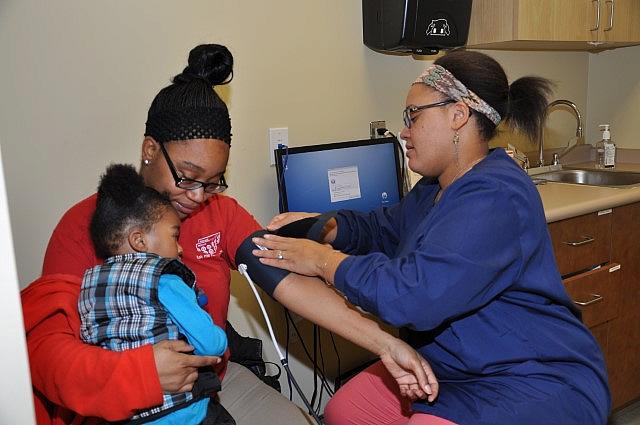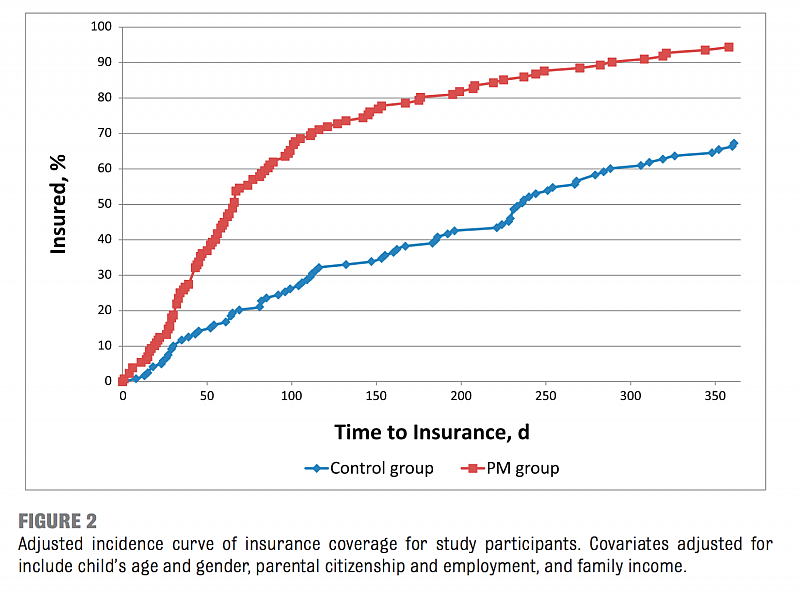Can parent mentors get millions of kids insured and save billions?

The percentage of kids in the United States who lack health insurance has reached a historic low in the wake of the Affordable Care Act, with about 6 percent of kids remaining uninsured, according to recent data. And that number is poised to drop further.
In May, California will begin offering Medicaid to low-income undocumented children. Florida hasn’t expanded Medicaid, but just last week the state’s governor signed legislation that removes the requirement that documented immigrant children must wait five years before they can receive public health coverage. Both moves mean more kids will be eligible for insurance.
Eligible isn’t the same as enrolled, however. Upwards of two-thirds of uninsured kids in the U.S. are eligible for Medicaid or CHIP, but aren’t signed up. That in turn can lead to sicker kids and more expensive ER visits. And yet there are some proven strategies for getting more eligible families enrolled. As previously noted, one effective way is to sign the parents up for insurance, since “the welcome mat effect” make it more likely parents will enroll junior, too. But that won’t always work, especially in states that haven’t expanded Medicaid, or in situations where Mom or Dad might not be eligible for coverage.
But a new study published online last week in Pediatrics outlines an intriguing alternative. Researchers studying families in Texas have reported remarkable rates of success in using “parent mentors” to get low-income minority kids signed up for health insurance. And according to researchers, the healthcare cost savings vastly outstripped the program’s modest costs.
The study focused on communities in Dallas, Texas that had “high proportions of uninsured minority and low-income children.” A randomized controlled trial broke 237 children into two groups, with one group subjected to traditional outreach methods for Medicaid/CHIP (think local ads, bus-stop banners) while families in the other group were paired with parent mentors.
To qualify, such mentors had to have at least one child in Medicaid/CHIP for a year or more. Mentors underwent a two-day training session before working with families of the same ethnicity and ZIP code, when possible, and received a small stipend of $33 a month. They were tasked with helping their assigned family understand the importance of insurance, navigate the application process, figure out how to access care and so on.
After nearly four years of tracking the experiment, researchers found the parent mentors were far more effective in getting kids signed up in insurance, with 95 percent of children receiving insurance in the mentor group. That’s compared with 68 percent of kids who became insured in the control. The authors write:
The [parent mentor] intervention also insured children faster, and was more effective in renewing coverage, improving access to medical and dental care, reducing out-of-pocket costs, achieving parental satisfaction and quality of care, and sustaining insurance after intervention cessation.
This graph shows the percentage of insured kids over time, with the group that received parent mentoring signing up at higher and faster rates. (Source - Pediatrics)
But the most eyebrow-raising number from the study is the health care cost savings reported —more than $6,000 for every year a child is insured. Parent mentors “were relatively inexpensive, at $53.05 per child per month, and saved $6,045.22 per year per child insured.”
Whence all the savings? One hypothesis floated by the study is that the kids in the parent mentor group received better access to health care and so didn’t get as sick nor require as many ER visits and hospitalizations as the controls, who were insured at lower rates.
The savings look even more impressive when multiplied. On the basis of these early findings, the researchers do a little quick back-of-the-envelope math and find that if such a parent mentor program was scaled nationally to reach all Medicaid/CHIP eligible kids, it could save from $21 to $25 billion annually. You have to skip over quite a few if-then statements to get to such vertiginous numbers, but the point is that the potential savings are more than a rounding error.
Last year, the public radio program Marketplace ran a story on health care super-users in which Dr. Ashish Jha, a professor at Harvard’s School of Public Health, told reporter Dan Gorenstein: “There are almost no interventions that we know of that improve health and save money. There are a couple of things that we do know. Vaccinations are probably the No. 1 thing. Once you get beyond that, it starts to get pretty tough.”
If this latest research on parent mentors can withstand the kind of scrutiny and replication that would obviously be required before scaling up, there might be one more unicorn in Dr. Jha’s very small stable.
[Photo by A Healthier Michigan via Flickr.]
Related posts
“Experts: More kids than ever are now insured, but challenges remain”
“How do you get more kids into health coverage? Start by enrolling their parents”
“What does mixed Medicaid news mean for kids’ health insurance?”

